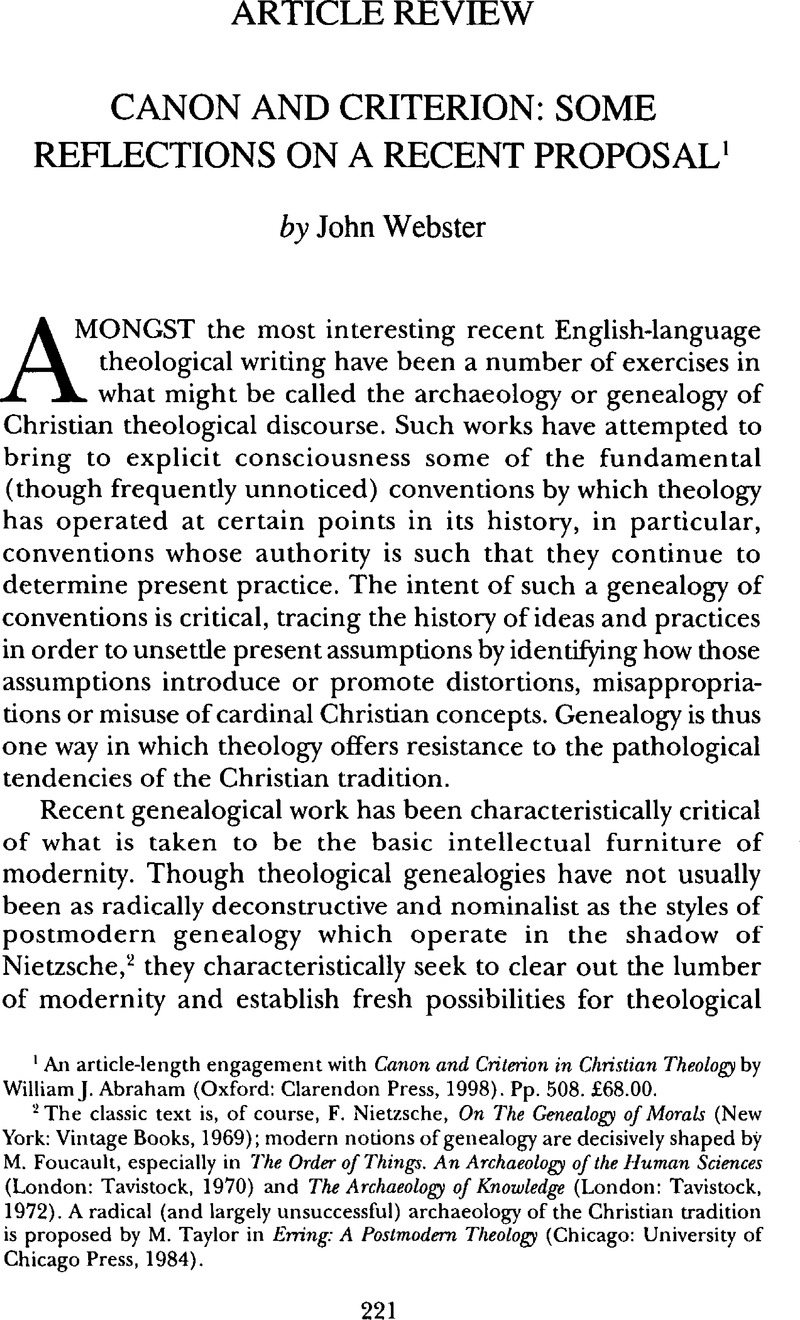Article contents
Canon and Criterion: Some Reflections on a Recent Proposal1
Published online by Cambridge University Press: 30 January 2009
Abstract

- Type
- Article Review
- Information
- Copyright
- Copyright © Scottish Journal of Theology Ltd 2001
References
2 The classic text is, of course, Nietzsche, F., On The Genealogy of Morals (New York: Vintage Books, 1969)Google Scholar; modern notions of genealogy are decisively shaped by Foucault, M., especially in The Order of Things. An Archaeology of the Human Sciences (London: Tavistock, 1970)Google Scholar and The Archaeology of Knowledge (London: Tavistock, 1972). A radical (and largely unsuccessful) archaeology of the Christian tradition is proposed by Taylor, M. in Erring: A Postmodern Theology (Chicago: University of Chicago Press, 1984)Google Scholar.
3 Buckley, M. J., At the Origins of Modern Atheism (New Haven, CT: Yale University Press, 1987)Google Scholar; Dupré, L., Passage to Modernity: An Essay in the Hermeneutics of Nature and Culture (New Haven, CT: Yale University Press, 1993)Google Scholar. On Dupré's account, see the instructive essay by Tracy, D., ‘Fragments of Synthesis? The Hopeful Paradox of Louis Dupré's Modernity’ in Casarella, P., Schner, G., eds, Christian Spirituality and the Culture of Modernity. The Thought of Louis Dupré (Grand Rapids, MI: Eerdmans, 1998), pp. 9–24Google Scholar. A somewhat more restricted account of some of the same issues is offered by Gunton, C., The One, The Three and the Many. God, Creation and the Culture of Modernity (Cambridge: Cambridge University Press, 1993).CrossRefGoogle Scholar
4 See Gunton, C., The Triune Creator: A Historical and Systematic Study (Edinburgh: Edinburgh University Press, 1998).Google Scholar
5 Thiemann, R., Revelation and Theology. The Gospel as Narrated Promise (Notre Dame, IN: University of Notre Dame Press, 1985).Google Scholar
6 Fiorenza, F. Schüssler, Foundational Theology. Jesus and the Church (New York: Crossroad, 1985).Google Scholar
7 On this last point, see the neglected study by Ritschl, D., Memory and Hope: An Inquiry Concerning the Presence of Christ (New York: Collier-Macmillan, 1967)Google Scholar, and my case study ‘Jesus in the Theology of Eberhard Jüngel’, Calvin Theological Journal 32 (1997), pp. 43–71.
8 Abraham, W. J., Canon and Criterion in Christian Theology: From the Fathers to Feminism (Oxford: Clarendon Press, 1998)Google Scholar. Subsequent page references in brackets in the main text are to this work.
9 ‘Of the highest order’ is an odd phrase, suggesting the curious notion of ‘gradations’ of special divine revelation.
10 Abraham's argument at this point is much indebted to Popkin's, RichardThe History of Scepticism from Erasmus to Spinoza (Berkeley, CA: University of California Press, 1979).Google Scholar
11 Most all, Charry, E., By the Renewing of Your Mind: The Pastoral Function of Christian Doctrine (Oxford: Oxford University Press, 1997).Google Scholar
12 Recent proposals in the area include Fowl, S., Engaging Scripture: A Model for Theological Interpretation (Oxford: Blackwell, 1998)Google Scholar; Fowl, S. and Jones, G., Reading in Communion. Scripture and Ethics in the Christian Life (London: SPCK, 1991).Google Scholar
13 On this, see my essay ‘Hermeneutics in Modern Theology: Some Doctrinal Reflections’, Scottish Journal of Theology 51 (1998), pp. 307–341.CrossRefGoogle Scholar
14 See my essays ‘Texts: Scripture, Reading and the Rhetoric of Theology’, Stimulus 6/4 (1998), pp. 10–16Google Scholar and ‘Reading Theology’, Toronto Journal of Theology 13 (1997), pp. 53–63.CrossRefGoogle Scholar
15 The absence is explained (p. 239, n. 50) by claiming diat his impact is too well known to require rehearsal.
16 Some background here can be found in Grafton, A., Defenders of the Text: The Traditions of Scholarship in an Age of Science, 1450–1800 (Cambridge, MA: Harvard University Press, 1991)Google Scholar; Mandrou, R., From Humanism to Science 1480–1700 (Harmondsworth: Pelican, 1978).Google Scholar
17 Kant, I., The Conflict of the Faculties in Wood, A. W., Di Giovanni, G., ed. Kant, I., Religion and Rational Theology (Cambridge: Cambridge University Press, 1996), p. 251.Google Scholar
18 Ibid.
19 Ibid., p. 262.
20 See Rogers, E., Thomas Aquinas and Karl Barth: Sacred Doctrine and the Natural Knowledge of God (Notre Dame, IN: University of Notre Dame Press, 1995).Google Scholar
21 Something of the same fate attends Newman who is again said to be ‘deeply captive to the epistemological anxiety which has come to preoccupy the Christian tradition in the West’ (p. 345): an odd judgment in view of the Grammar of Assent.
22 For a quite different picture, see the recent study of Jones, S., Calvin and the Rhetoric of Piety (Louisville, KY: Westminister/John Knox Press, 1995).Google Scholar
23 Calvin, J., Institutes of the Christian Religion (Oxford: Oxford University Press, 1960), p. 6.Google Scholar
24 Ibid.
25 Ibid., p. 8.
- 2
- Cited by


